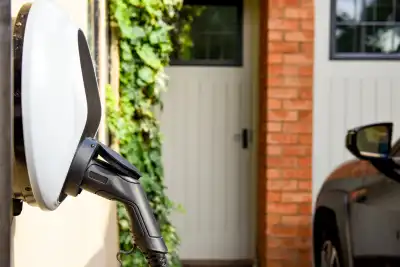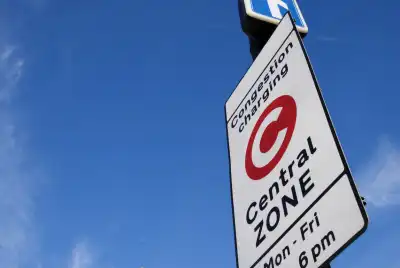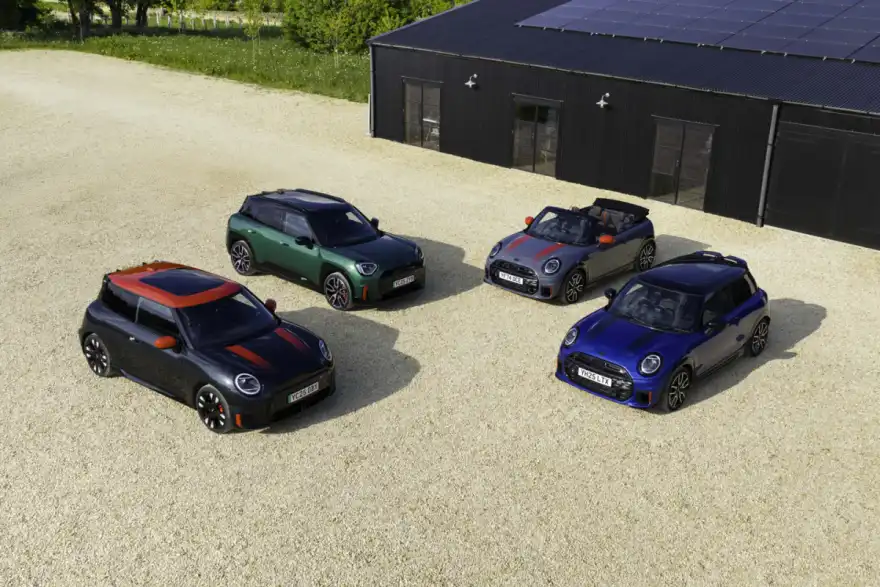
Any MINI carrying the John Cooper Works badging is always that little bit special as it delivers on all counts for driving purists who enjoy an ‘engaging’ performance from their vehicle.
But where did it all begin and what exactly is John Cooper Works?
The story started way back in 1961 when MINI began collaborating with John Cooper who was renowned for building rear-engined Formula 1 and Formula 3 cars. And it was that joining of forces that turned a modest car into a racing champion.
John Cooper recognised the potential of the classic MINI and he integrated a more powerful engine, new brakes and sharper steering, and so it was that in 1961, the first MINI Cooper was born.
By 1964, the MINI Cooper was recognised globally and was sought after for its style and performance in equal measure. Against all the odds, it won almost every competition it entered including an historic trio of victories at the Monte Carlo Rally in 1964, 1965 and 1977.
Adding Buggy styling along with 4x4 to the mix resulted in even more success in global rally competitions with the vehicle going on to claim top spot in the infamous Dakar Rally in 2020 and 2021.
And in more recent times, the John Cooper Works treatment has been added to a number of MINI road cars, bringing a real edge to their performance.
We were offered the chance to test out four models – two electric and two petrol - to see if they really live up to all that hype. The answer is a resounding yes on that front.
The latest MINI Cooper Electric and the recently-launched all-electric Aceman have been given the JCW treatment for the first time. These models are powered by a 54.2kWh battery delivering 258hp and 340Nm of torque. The MINI John Cooper Works Electric costs from £34,905 and boasts a 0-62mph sprint time of just 5.9 seconds with a driving range of 251 miles, while the MINI John Cooper Works Aceman is priced at £36,905 and can complete the 0-62mph dash in 6.4 seconds. This car can cover 243 miles on a single charge and both vehicles max out at 124mph.
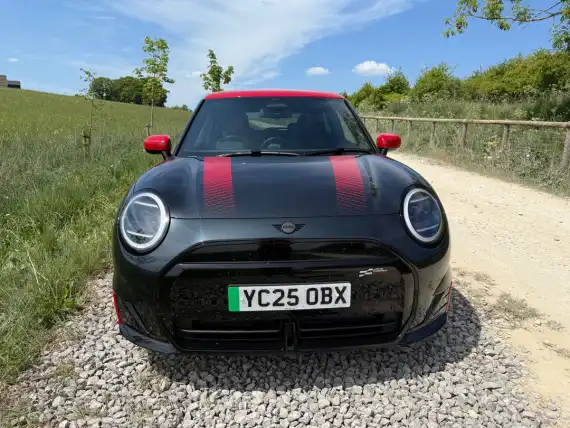
Additionally, the petrol-powered MINI (£33,265), alongside the MINI Convertible (£37,535) also feature the JCW fun factor. These models are driven by a 2.0-litre four-cylinder petrol engine offering 231hp and 380Nm. That results in 0-62mph sprint times of around 6.4 seconds for the MINI JCW and 6.1 for the open-top with top speeds of 152mph and 155mph respectively.
First up on our test route through the beautiful Cotswolds was the three-door MINI JCW Electric in dazzling Legend Grey with all the red accents that JCW brings to the table. Expect extra stripes, a two-tone roof, red mirror caps, 18-inch JCW wheels, plus red calipers.
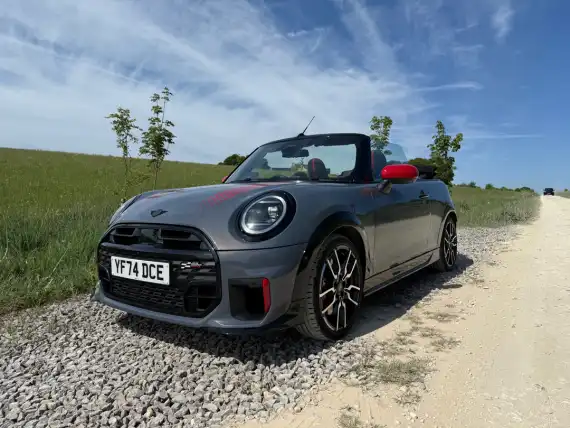
Our test car had a price-tag of £40,270 with all the trimmings while standard features are also comprehensive. So expect to see JCW sports seats, a pitch perfect Harman Karman sound system, a panoramic glass sunroof, heated seats, a head-up display and lots more besides.
The interior is exceptionally sporty in its design with a predominantly black colour scheme along with lots of red piping to give it a dynamic edge. And there is a clear circular 24cm touchscreen that is the access point to the wealth of on-board tech.
But while JCW models gain extra sporty styling traits, the real attraction comes in the performance. This car looks blisteringly quick, and it most certainly is. It’s ridiculously fast off the mark and the handling is unbelievably confident when pushed hard into corners. That go-karting MINI heritage is apparent on every twisting country lane.
Drive modes alter the handling with the Go-Kart setting really increasing the aggressive nature of the car. A rather tempting BOOST button delivers extra grunt for 20 seconds and expect to hear synthesised sounds to accompany the performance.
Remaining on the EV theme, our next car was the Aceman which is relatively new to the MINI stable and looked gorgeous in traditional British Racing Green, along with some JCW accents once again. This car cost £44,570 which takes into the £40k premium car tax territory and that means owners will need to find an extra £425 from years two to six.
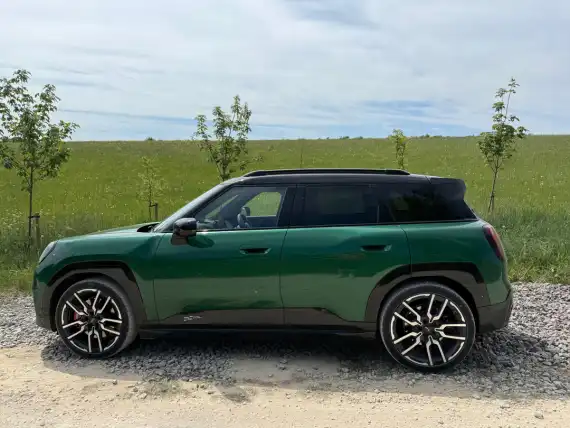
The five-door Aceman JCW looks gorgeous from all angles and the larger 19-inch alloys give it a very strong road presence. In addition to the drive modes called Balance, Timeless, Vivid, Personal, Green, Core and Go-Kart, the Aceman introduces Trail to the mix.
Once again, the acceleration out the starting gates is blisteringly fast – it really is one of the biggest attractions of driving an electric car. There is always ample power for quick overtakes and the balance and handling cannot fail to impress.
The cabin is beautifully hushed against the outside world, but you do feel the effects of poorer road conditions due to the larger wheels. They may look good, but at the price of comfort.
Next it was the turn of the traditionally-powered MINI John Cooper Works costing £36,350. With a sprint time similar to the EVs at 6.1 seconds from standing start to 62mph, this three-door MINI JCW certainly ticks all the right boxes and has a ‘proper’ soundtrack to match the performance.
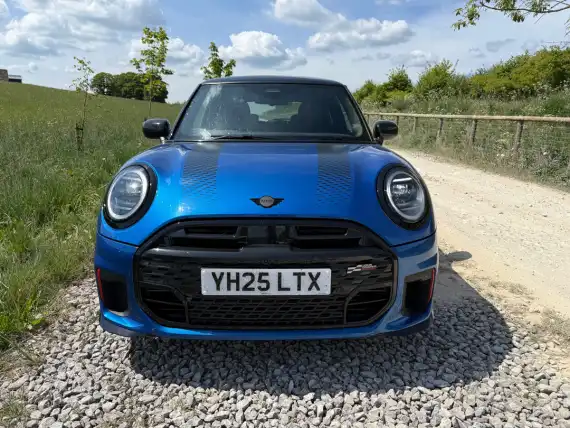
It can deliver a WLTP-tested 34.6mpg with carbon emissions of 154g/km, but drive it in the manner it deserves and that efficiency figure will certainly be lower. Our car was in an Icy Sunshine Blue shade and was a real head-turner as it rumbled through quaint towns and villages. Press that BOOST button and you are gone in 20 seconds!
Paddles offer extra control over the gear changes and there is a head-up display to keep a watchful eye on the speed. Elsewhere, the centrally-positioned large circular dial is the car’s nerve centre, but the icons are large enough and it’s very easy to operate on the fly.
The traditional toggles are always a great MINI feature and they control the gears, the ‘Experiences’ or drive modes, along with powering up or down the engine.
Finally, with a glimpse of summer on the horizon, we get the MINI John Cooper Works Convertible, priced at £39,049. Day-to-day running costs are not quite so good as the standard three-door MINI JCW with combined fuel efficiency dropping slightly to 33.1mpg and carbon emissions increasing to 161g/km – but they are the only disadvantages as far as we’re concerned.
The roof can be automatically lowered at the press of an overhead switch and that’s when the full open-top driving experience can be enjoyed to the full.
Like its siblings, the sporty JCW cues are there such as the red accents on the outside and red and black knitted dashboard, plus lots of JCW badging. It’s a car that really stands out in a crowd and the performance is, once again, as expected from any car gaining the race-inspired JCW treatment.
Flick through the modes and it not only changes the car’s dynamics, but also its interior appearance with calming colours, racing red themes and everything in-between.
All four of our test cars had their own identity, but they all had one thing in common and that’s the way they responded when put to the test. And in our book, if you’re thinking of buying a new MINI and you have a hankering for performance, check out the latest JCW models first. They do cost extra, but you won’t be disappointed that’s guaranteed.

